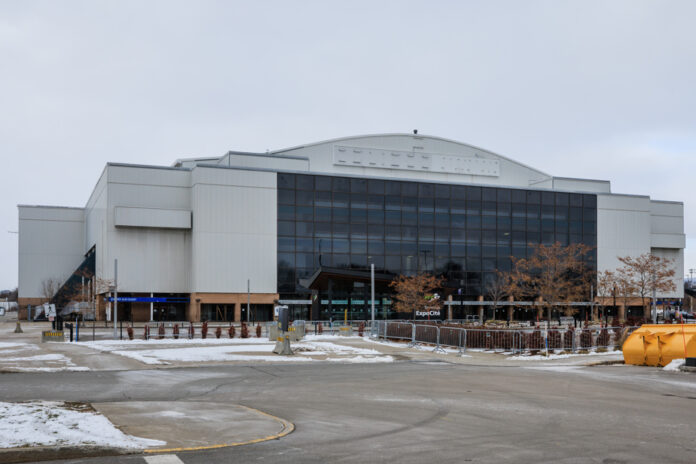(Quebec) On September 14, 2015, the symbolic burial of the old Colisée in Quebec took place. Who better to officiate this ceremony than the band Metallica? When the last notes of Enter Sandman finished resounding, the spectators left, bidding farewell to the venerable building.
But against all odds, eight years later, the Colosseum still stands. It suffers from comparison with the Center Videotron, younger, larger, located a stone’s throw away. It appears aged, faded, like an ocean liner abandoned by its crew. But he’s still there.
Régis Labeaume had nevertheless announced his intention to demolish it. The former mayor changed his mind, particularly in the face of the explosion in costs.
During the last municipal election campaign, Bruno Marchand proposed retaining only the arches of the arena, as a nod to the past, and building a new neighborhood nearby.
But now everything seems on the table today in this issue which has been making headlines for almost ten years. The Marchand administration is launching expert consultations this week to determine what to do with the old Coliseum and the parking lots surrounding it. Citizens will then be consulted in the first quarter of 2024.
“We want to see experts and citizens, to understand what people want and what can be done,” explains Mélissa Coulombe-Leduc, elected responsible for the file in the Marchand administration. “Everything is on the table as far as possible and realistic. »
The Marchand administration is still in favor of the construction of housing in the parking lots to the northeast of the building. The mayor recently announced that faced with the housing crisis and favorable demographic forecasts, Quebec City must double construction starts.
This idea arouses the support of the leader of the official opposition. “Since the City has a goal of 80,000 new housing units by 2040, concrete surfaces like this represent a golden opportunity,” notes Claude Villeneuve.
But if elected officials seem to have an idea of what to do with the parking lots near the Colosseum, the future of the old amphitheater itself is today more nebulous than ever.
The Labeaume administration had commissioned studies which estimated the demolition of the former home of the Nordiques and the Remparts at $17 million. The presence of lead and asbestos caused the bill to skyrocket. And that was before the pandemic and the skyrocketing costs in the construction industry.
Mr. Labeaume’s former team proposed during the last campaign to transform the Colisée into a multi-sports center. But the proposal had upset the owner of a climbing gym located very close to the premises since Régis Labeaume had proposed to erect… climbing walls there.
The idea has since been abandoned by Mr. Labeaume’s former team.
At one point in 2022, the idea floated of razing the Coliseum to build a new baseball stadium. Then according to our information, promoters wishing to create a First Soccer League team in Quebec also tested the waters to use the site. But their deadlines were too tight.
In the meantime, the City is renting the old amphitheater to the Festival d’été de Québec, which stores its equipment there. The rent helps cover maintenance costs, the City recently assured the newspaper Le Soleil.
Destroy or preserve the building? The question doesn’t seem to want to die. To inform its reflections, the City of Quebec commissioned a soil characterization study to detect any contamination and a study on the environmental costs of the demolition of the Colisée.
“As I recall, the City had already estimated around 20 million to upgrade the Coliseum, without any particular purpose. If we think that the demolition will cost around that, we are pretty much kif-kif at the moment,” notes Ms. Coulombe-Leduc.
In all these debates, the question of heritage character is rarely raised. It must be said that the beauty of the old Coliseum from 1949 was largely hidden during the 1980 expansion to mark the entry of the Nordiques into the National League. Several refinements designed by the modernist architect Robert Blatter, well known in Quebec, have been lost forever.
The original architecture of this “important milestone of modernity” was “completely ruined” during the expansion, notes Martin Dubois, president of the firm Patri-Arch and consultant in architecture and heritage.
Stripping down the old Colosseum and returning to Blatter’s version would prove a difficult undertaking, he said. “It’s not a simple unpacking, but a more complex and very expensive operation for a building that we no longer know what to do with. Technically it wouldn’t be impossible, but I doubt it would be possible. »
“For my part, Blatter’s Coliseum was irretrievably lost during the works in the late 1970s,” he says.
The person responsible for the Coliseum file, who is also responsible for heritage on the executive committee, is of the same opinion.
In Quebec, the idea of destroying the building seems to have been around for years, even among several of those who experienced the Colisée’s best years.
“It was a building rich in great hockey moments. It’s certain that a demolition will do something, but with the Videotron Center, we’ve moved on to something else,” believes Maurice Dumas, a former journalist at Le Soleil who covered the Nordiques for 15 years.
Claude Lavoie, who had the “honor” of being the house announcer during the Nordiques’ last match in the Coliseum, is of the same opinion. “The charm was the teams that played there and the memories that were made at the Coliseum,” he says. I have this impression that people have moved on. Hockey now is at the Videotron Centre. »















